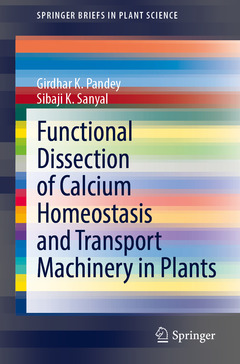Description
Functional Dissection of Calcium Homeostasis and Transport Machinery in Plants, 1st ed. 2021
SpringerBriefs in Plant Science Series
Authors: Pandey Girdhar K., Sanyal Sibaji K.
Language: English
Subjects for Functional Dissection of Calcium Homeostasis and...:
Approximative price 52.74 €
In Print (Delivery period: 15 days).
Add to cart
Publication date: 12-2020
115 p. · 15.5x23.5 cm · Paperback
115 p. · 15.5x23.5 cm · Paperback
Description
/li>Contents
/li>Biography
/li>Comment
/li>
This book focuses on the significance and implications of Calcium (Ca2+) transport machinery in the plant cell in generating alternating Ca2+ levels and impacting the cell?s physiological, biochemical and developmental processes. In the following sections, the concept of Ca2+ homeostasis, Ca2+ signature, various Ca2+ transport protein families and conductance systems would be discussed in detail- elucidation of their functional characterization, structure, mechanism, sub-cellular localization and specific physiological roles in ensuring Ca2+ homeostasis. Also, the aspect of Ca2+ as a ?signaling hub? ?transducing distinct plant responses to diverse environmental stimuli, Ca2+ binding proteins, and the tools used in studying these proteins are explained in brief to paint a holistic picture of Ca2+ transport in plant systems. This has resulted in an elaborative literature account to serve as a staple by providing recent insights and advance knowledge surrounding genetic and molecular dissection of Ca2+homeostasis maintenance mechanisms and extant Ca2+ transport systems in plants.
Preface
Introduction to cellular calcium
• Utility of calcium in plant world
• Structural and nutritional functions
• Calcium ionic balance and its signaling functions
Cellular calcium homeostasis
• Cytosolic calcium
• Sub-cellular calcium reserves
• Generation of calcium waves or signatures
Significance of calcium signatures
• Physiological relevance of calcium signature
• Calcium signature - mediator of upstream signal perception and downstream cascading• Implications of specific calcium signatures with respect to diverse environmental cues
• Influence on nutrient sensing, growth and developmental processes
Cellular calcium transport machinery
• Physiological attributes of calcium permeable ion channels
• Characterization – Influx & Efflux channels
Calcium conductance across plasma membrane
• Plasma Membrane localized Non- selective Cation channels (NSCCs)
• Mechanosensitive calcium channels (MCCs)
• Depolarization activated calcium channels (DACCs)
• Hyperpolarization- activated calcium channels (HACCs)
Identification of other influx channels based on cellular localization- Endomembrane and vacuolar ion channel
• Endomembrane calcium channels
• Vascuolar calcium channels – VVCas & SVs
Other non- selective calcium conductances Ca2+
• Annexins
• Cyclic nucleotide-gated channels (CNGCs)
• Ionotropic glutamate receptors (iGLRs)
• Two pore channel 1 (TPC1)
• Several other channels (MSLs, MCAs, OSCA1, piezo channels)
Calcium extrusion systems and Efflux transporters
• Ca2+ - ATPases
• Ca2+/H+ exchangers (CAXs)
Cellular Ca2+ Hubs
• Overlap with reactive oxygen species (ROs) hubs
• Interaction & crosstalk with other nutrient ions
Recent advances in biotechnological tools and approaches
• Early tools & techniques employed – current utility
• Live cell imaging for real- time visualization of in-vivo Ca2+ signatures
• Genomic and functional analytical strategies
Conclusions & Future Perspectives
• Scope in other plant model systems
• Comparative and evolutionary analysis of Ca2+ transport systems – plants vs animal lineages
References
Abbreviations
Index
Girdhar K. Pandey is working as Professor in the Department of Plant Molecular Biology, Delhi University South Campus, New Delhi, India. He is the Fellow of National Academy Sciences, India (NASI) and National Academy of Agricultural Sciences (NAAS), India. His group’s research interest is to understand the detail mechanistic interplay of calcium-mediated signal transduction networks in plants under mineral nutrient (potassium and calcium) deficiency and abiotic stresses. He has published more than 80 articles in international journal of repute. He has edited (5) authored (4) books. He is also serving as editorial board/associate editor in several international reputed journals. For further detail information visit his lab web-page: http://www.dpmb.ac.in/index.php?page=girdhar-pandey; https://sites.google.com/site/gkplab/home.
Dr. Sibaji K Sanyal is a former PhD student of Prof. Girdhar K. Pandey and currently working as Research Associate (Post-doctoral fellow) in DBT-India sponsored program
Addresses an area of major research and development
Discusses calcium mediated signaling and regulation of biotic and abiotic stresses
Presents recent advances of biotechnology in this area
© 2024 LAVOISIER S.A.S.
These books may interest you

Calcium Transport Elements in Plants 204.32 €



